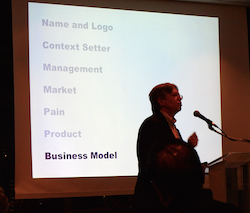Hearing angel investor David S. Rose (@davidsrose) speak last night at Hoboken Tech Meetup was the equivalent to speed reading a course in startup financing, marketing, and management in under an hour.
Rose has a lot to say, and he communicates in complete sentences, leading to fully-developed paragraphs with footnotes. In other words, the 100 or so entrepreneurs gathered at Stevens Institute of Technology’s Howe Center absorbed incredibly practical information (with just basic analog voice technology and a few slides).
Rose focused on the finer points of raising private money. He should know. Through his various incarnations—as founder of New York Angels, CEO of AngelSoft, and through his own super angel firm, Rose Tech Ventures—he’s been involved with funding over 80 companies.

Did I mention that he also has a reality TV show on the MSN website, called Second Chance, in which he works with entrepreneurs whose first ventures failed, guiding them to startup redemption?
At HTM yesterday, Rose filled in more than a few gaps in my understanding of the startup money race.
Rose started out his career at the receiving end of the financing relationship, founding eight companies, including AirMedia, one of the first wireless data networks, as well as helping to boot up the NYC tech scene.
And then as he put it, he moved over to the dark side, as a private tech investor.
According to an Angel Capital Association survey that Rose presented, most angels, which is really shorthand for individuals with high net worth who invest in private companies (or in SEC terms, “accredited investors”), are much like him: former successful serial entrepreneurs (2.7 ventures ), well educated, older (mid-50s), running at a 100 GHz, and typically investing 10% of their net worth for up to nine years in ten ventures (for a total portfolio of between $100,000 to $1 million) with younger versions of themselves.
Their motivation is profit and fun and contributing to the pool of startup karma.
Though you begin to wonder about what Rose and other angels’ idea of fun is. And there are less hair-raising ways to get a positive return on investment.
It’s not an easy life, and you sense that Rose has heard many, many pitches: I imagine him having listened to every possible permutation of social networking out there.
So what does it take to get funding from Rose or other seraphs?
If a startup decides to seek outside investors—it is possible to bootstrap a company based on, um, selling something and getting revenue or, surprisingly, applying for government grant money—it will have to first pique an angel investor’s wandering interest with a written description of the venture.
While all startups should have a detailed business plan, angels don’t read them since they’re too busy. A shorter executive summary may be glanced at and a one page precis could in theory capture the attention of an angel but something even shorter, say a well-written two-paragraph email, has a better chance 0f gaining an audience with an angel.
If the email or some other method does get you that rare in-person angel meeting, then a tight 30-second pitch that is completely on message about what it is the company does and why you’re the one to do it, may lead—there are no guarantees in any of this—to a formal date.
For that, you’ll need to prepare “the presentation”—i.e., generally slides but other media can be used. As with dating, there are rules to this.
According to Rose, presentations should have in the following order: name and company logo, opening hook (a surprising fact or two), what your company actually does for a living, your management team (why they’re indispensable), a clear overview of the market (as in dollar size), the market pain points (what the startup is trying to solve), the product that relieves the pain (some images of the app, website, or physical product should be inserted), the business model, current or potential customers, marketing strategy, competitive challenges (be honest), barriers to entry (intellectual property or domain expertise or something else that makes this venture unique), and financial projections (sales charts). Additionally, a “pre-money” valuation (see below) can be included but this only makes sense if the startup has a deal in progress with another group of angels who have independently blessed the founders’ estimate of the worth of their business.
On that last point, there are brutal economic facts that determine what investors want for their return on investment. If a typical angel has say 10 investments locked up for a few years, he or she knows that half will fail, a few will return their capital, leaving just one with the burden to bring home the bacon.
If you do the business school calculations (assuming a 25% internal rate of return over 6 years), it mean that the one successful company will have to pay off 20 to 30 times on the initial investment.
On the assumption that a startup convinces two or three investors to fork over a total of $1 million, a startup should have a planned exit valuation of about $30 million for just the investors. The founders and their management will have their own payday of course but that depends on the pre-money worth of the company: in other words, the dollar value of what they brought to the table.
If a startup and these celestial beings can come to terms on an appropriate pre-money valuation—$1 million to $3 million is the range of most of the pre-revenue tech deals these days—then the startup can enter a serious long-term relationship with the angels.
And that’s it.
Related articles
- Rose Tech Ventures (rose.vc)
- David S. Rose (davidsrose.com)
- Second Chance (msn.com)
- How investors determine the valuation of your company (marsdd.com)
- Small Business Innovation Research Funding (SBIR/SBTTR) (sbir.gov)


